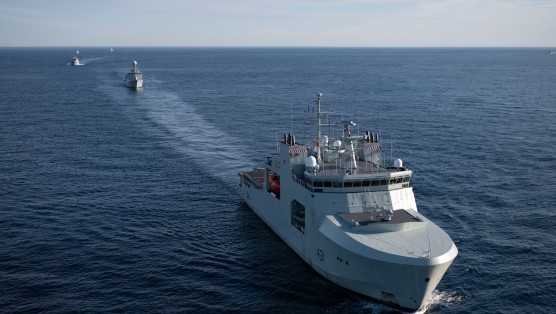Just hours before a naval detachment from Russia is scheduled to arrive in the country, a patrol vessel from Canada, the HMCS Margaret Brooke, will also, announced Cuba’s Revolutionary Navy.
According to the official statement the Canadian ship, which has never visited the island, will arrive in the country's capital on June 14 through the Port of Havana.
"The visit, which will last until the 17th of this month, takes place in the context of the 80th year of our uninterrupted diplomatic relations with that country and the 50th anniversary of cooperation ties," the statement read.
According to the Navy, "the vessel belongs to a new series recently introduced in the Royal Canadian Navy, and her visit to our country highlights our bilateral collaboration to contribute to peace in our region."
"This ship's stay in Havana will take place before returning to its home port in Halifax, and offers an opportunity to celebrate and strengthen the historic bilateral relationship between Cuba and Canada. It also follows up on the visits received in 2016 and 2018 by the frigates HMCS Fredericton and HMCS Charlottetown, respectively," it concludes.
Moreover, the visit by the ship from Canada, a member country of the North Atlantic Treaty Organization (NATO) since its foundation in 1949, will take place after a set of Russian vessels arrive this Wednesday, June 12: the frigate Admiral Gorshkov, the nuclear submarine Kazan, the oil tanker Akademik Pashin, and the rescue tug Nikolai Chiker, a Russian naval group deployed amid growing geopolitical tensions due to the West's military support for Ukraine, which is defending itself from Moscow's invasion.
Interestingly, the Canadian ship will remain on the island until June 17, the same day that the Russian naval group is slated to leave, presumably bound for Venezuela.
The Margaret Brooke, delivered in 2021 and commissioned in 2022, is the second Harry DeWolf-class offshore vessel of the Royal Canadian Navy, and is primarily designed for patrolling and surveillance support in Canada's Arctic regions, although in 2023 and 2024 it conducted operations in the Caribbean.
With a crew of 65 and accommodations for 85, the ship is armed with a 25-millimeter (0.98 -inch) BAE Mk 38 cannon and two M2 Browning machine guns. It also features an onboard hangar and a flight deck for medium-sized helicopters, according to the ship's official website.
In August of 2022 the Margaret Brooke was one of Canada's ships deployed to the Arctic as part of a multinational military exercise, Operation Nanook, and the following month she participated supporting first responders following the devastating impact of Hurricane Fiona in Newfoundland, northern Canada.
In February of 2024 the ship was involved in an anti-drug smuggling operation in which it seized 510 kilograms of cocaine in the central Caribbean during a deployment, in collaboration with the US.
The presence of the Margaret Brooke in Havana arouses suspicion, especially after it became known that US and Canadian naval and air forces are closely surveilling the Russian flotilla traveling to Havana.
Military analysts from the X profile TheIntelFrog said that Washington's military vessels are the destroyers Traxtan and Donald Cook, as well as the Royal Canadian Navy frigate Ville de Quebec. Included in the deployment are the US Navy's P-8 Poseidon anti-submarine aircraft and the Royal Canadian Air Force’s CP-140 Aurora patrol aircraft.
John Kirby, Strategic Communications Coordinator for the White House National Security Council, told CBS that the United States has no data on the presence of nuclear weapons on Russian ships. These are also not expected to be used during the exercises. However, he noted that, according to US intelligence, the Kazan submarine has a nuclear facility.
According to the same report, the US Navy ships following the Russian flotilla will wait for it to finish its stay in Cuba, and will follow it when it leaves Havana Bay.
DIARIO DE CUBA verified, at the close of this report, that the HMCS Margaret Brooke was in Key West, in southern Florida (USA) after skirting the northern coast of Cuba in recent days.
